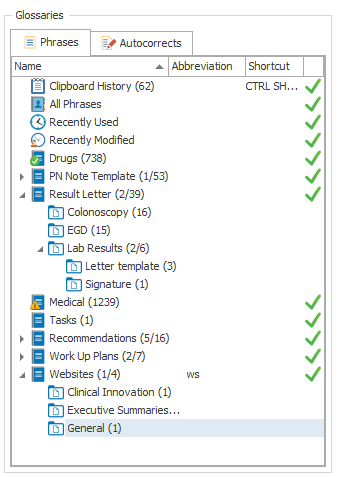All the data PhraseExpander works with are stored in glossaries, used to organize and share data.
PhraseExpander works with two different kinds of glossaries, according to which items are stored in them: Phrases and Autocorrects.

The glossary pane displays all the glossaries stored in PhraseExpander
Phrases glossaries
Contain the list of phrases and the associated abbreviations. A phrase will be expanded (upon confirmation) when the associated abbreviation is typed. Phrases glossaries can also contain macros and perform advanced functions like launching applications and websites, requesting user input and more. See macros.
In Phrases glossaries, phrases can be further organized in groups.
Autocorrects glossaries
Contain a list of pairs (wrong form, correction), used to automatically correct your spelling mistakes as you are typing. This type of glossary is not meant for expanding abbreviations to full sentences, but mainly for correcting typos.
Autocorrects are triggered automatically when you reach the end of a word (or small sentence), upon pressing a separator key (SPACE, ENTER or punctuation marks).
Autocorrects can also be triggered immediately after typing the last letter that composes the autocorrect. This is useful when you want to insert special characters (like accented letters that are not present in your keyboard) inside a word.
Special Glossaries
PhraseExpander has also some special glossaries that are automatically created: they are All Phrases (or Autocorrects), Recently Modified, Recently Used and Clipboard History.